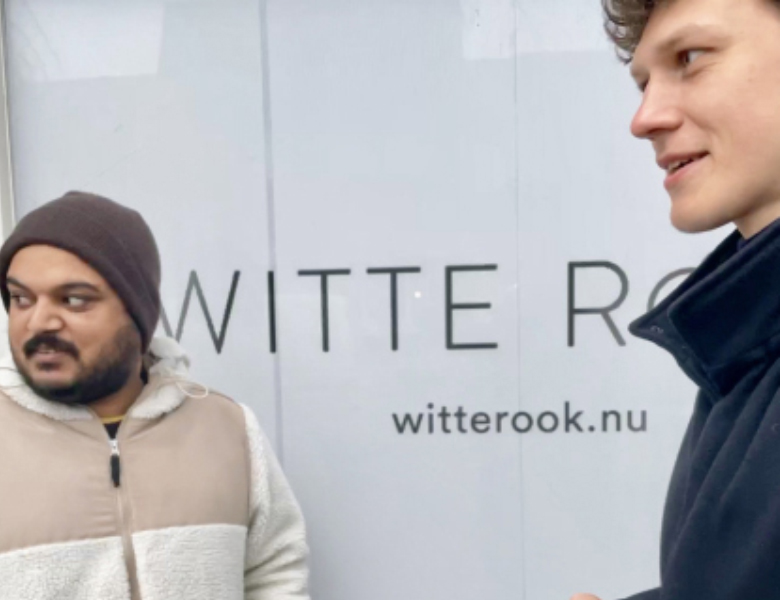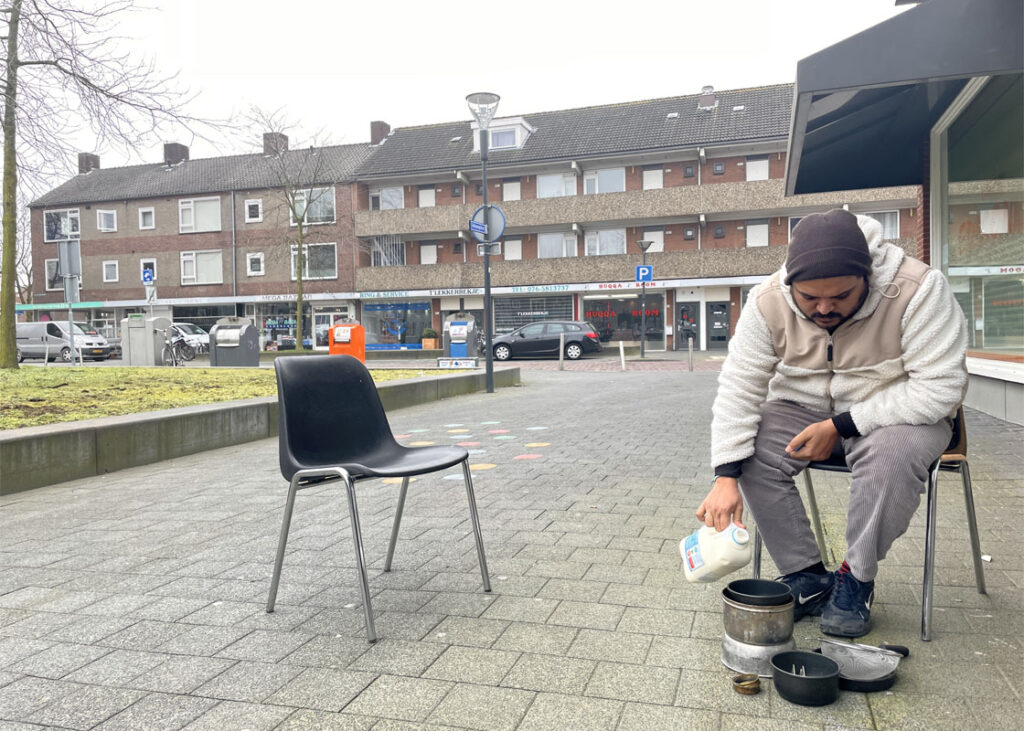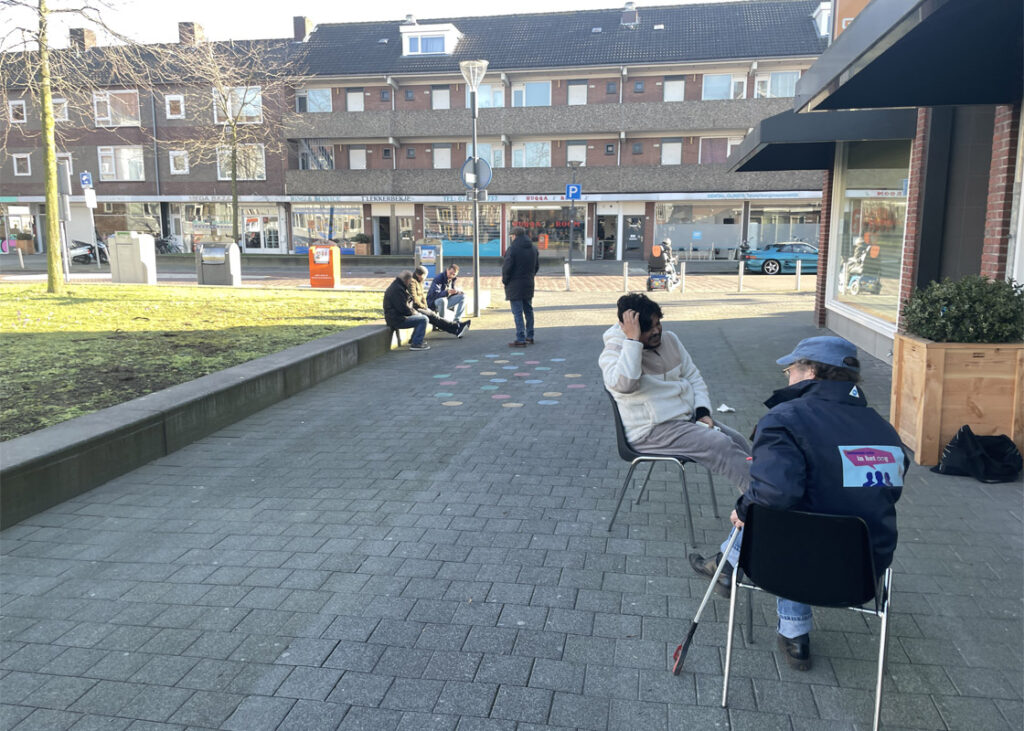 Agenda
Artikelen
Programma
Agenda
Artikelen
Programma

Insquare is a collective founded by Pankaj Tiwari and Dimitri van den Wittenboer. In our collaborative artistic practice we explore the potentiality of space. We approach space through its performative dimension questioning how it is produced and lived by human interactions with each other and our environment. Our artistic aim is to challenge the established socio-political structures by discussing, imagining and performing alternative prototypes*.
We believe that Art as a tool or as an applied medium is not revolutionary, but art as living practice it is. So, at the moment, we are an epicentre of experimental energies. We try all the so-called “ideal societies” and their practices. Especially, the ones that have been claimed to exist only in theory**.

Every month we go for a short residency to different places to share our ideas and practices with different communities.
We ask three main questions
How to create safe spaces for discussions?
How to imagine alternative ways of living together?
How to perform sustainable prototypes?
The residency at Witte Rook on the one hand helped us to develop our artistic positions and questions but also to explore them through actions in the neighborhood. We see public space as a realm where we can engage with people who we do not know to extend our perspectives.
The actions included using the window of the Buurtsalon as a mind map for public thinking, reading books in public space, inviting others to read their books, creating a space for listing to stories, making chai and sharing it and last but not least inviting people to have food together at Witte Rook on the last day. From our practical experience we developed a score that we call Toolkit for Public Commoning. It is an attempt to share our working methods and to invite others to try them.
………………………..
Tip: Think about what to say if asked why you are doing this
Add-ons
Several practices can be added to the core of Cooking and Sharing as add-ons .
A. Public Reading
Tip: keep it simple and use metaphors
Public inviting can be an add-on to cooking and sharing, but it can also be practiced on its own.
We recommend doing this practice with a collaborator, this will create less suspicion from the side of the passers-by.
Tip: Put focus on listening and ask questions.
Tip 2: Tell the people that you are doing this to get to know new people in the neighborhood.
………………………..

During our short stay in Breda, we developed and tried this toolkit in the neighbourhood of Witte Rook. Our aim was to engage with people and to see what can come from sharing food and time with others.
We started by putting two chairs on the Edisonplein in front of the Buurtsalon and cooking Indian chai on a small camping cooker. The Edisonplein has a variety of small shops. We went there to buy the black tea, ginger and sugar and told the owners about our practice and invited them to join. Although not all of them came, awareness was created about our practice and it was more connected to the local community. While cooking the chai we knocked on the door of the Buurtsalon and asked if we could use their window to draw a mind map. They welcomed our project and offered us more chairs because some people were already waiting for the chai and engaging in conversations. We started drawing a mind map with the main questions of our research and invited the people who were there to join the discussion. Many interesting contributions came, but we also noticed the limitations of this practice. Often the people had difficulties connecting to our terms so that we realized that this practice needs to be developed by finding a way to communicate with un-informed participants. We invited the people to come again on the next day for the public reading and bring something that they would like to read. The next day we repeated the session. It was interesting that some people came again and also brought their own books. There was, however, a limitation in the language since our Dutch is only basic. Next to those practices at the square, we did two hour walks each day in the neighbourhood. Our aim was to meet people who are open for conversation and invite them for lunch, which we did at Witte Rook on the last day. We were amazed by the openness of people to talk to us and most of the ones who we had invited came.

Overall we can say that while most of the people we met welcomed us with an open heart and engaged with enthusiasm, some were hesitant and questioned our intentions. What we have learned throughout our work in urban spaces is that it takes time to be accepted by the people. Trust has been broken badly, by using public spaces and the creative medium for commodified relations and the exercise of power. So that now, if we want to explore alternatives it always must start with building trust. We asked ourselves “How this trust can be built?” “How can something be introduced into everyday life that is unusual?” Our answer is that it needs time and repetition to establish a new way of living together. Even in three days, we could see progress in this trust towards us and our unusual actions.
Another question we asked ourselves is: “Why are we doing this?” Our answer is that it is not an act of charity, not social work, because we as individuals were looking for those connections with the neighbourhood. We are practising prototypes of structures that we miss ourselves. It is therefore a collaborative position.

Finally, we always ask ourselves, “What did we learn and what is the next step?” The time in Breda helped us to develop our ideas through the practical work that we described, but also through the readings that we did in the night and through an online conversation that we had with the local artist Klaas Burger. At this moment Insquare is in its starting phase and we will continue to learn and sharpen our tools in the future. We are planning to develop the Toolkit for Public Commoning in following residencies and to also invite others to perform it in their neighbourhoods.

While as artistic research and practice this format of a short term residency is something important to us, we also feel a need to establish long-term relationships with our collaborators. We would like to thank everyone who we met during our stay in Breda for an inspiring time and especially the Witte Rook team for welcoming us and hope to come again soon to continue the work.